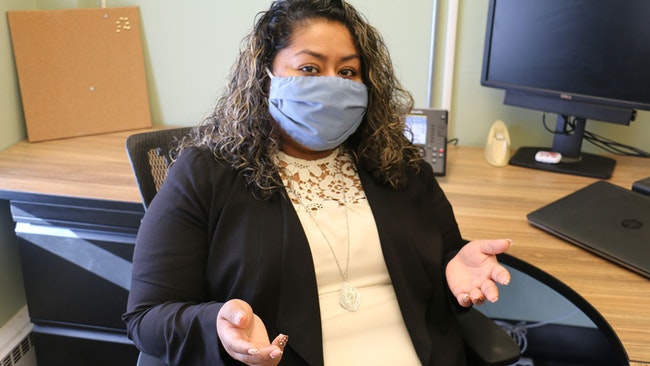
Jacqueline Cuevas, a victim’s advocate for the Malheur County District Attorney’s Office, said there isn’t an easy answer to domestic violence. Cuevas said the district attorney’s office handles four to six domestic violence cases a week. (The Enterprise/Pat Caldwell)
VALE – At night when their dad began to beat their mom, the children pretended to be asleep.
Behind closed eyelids and beyond the bedroom doors, they listened to the sound of two voices escalate and knew by the tone when the violence began.
“They pretended to be asleep so the situation wouldn’t escalate any more. They knew what to do when something happened at home. To me, that hits a soft spot when children are involved because they watch and learn,” said Jacqueline Cuevas, a victim’s advocate for the Malheur County District Attorney’s Office.
A sense of underlying terror often leaks from the straight-forward nature of police domestic violence reports. Evident is the reluctance of victims to report the crime.
July 5, for example, Juan Haro, 57, held a screwdriver to his ex-wife’s neck when she opened the door of her car after returning to her Ontario home after work. Haro’s ex-wife did not report the incident until two days later, after Haro showed up at her house uninvited.
During the July 5 incident Haro, a Nyssa resident, accused his ex-wife of “sending people after him” and of “being” with other men, according to an Ontario Police Department report. The ex-wife said she could feel the screwdriver on her neck and was scared and didn’t know “what she was going to do” according to the report.
Police said the ex-wife was able to eventually “talk Juan down” and gave Haro money and he left. When police asked the ex-wife why she didn’t report the incident sooner, she told police she “felt like she was at fault for his past and him going to prison and jail.”
Haro was subsequently sentenced to three years in prison for unlawful use of a weapon.
In another case, Fernando Gonzales, 47, Ontario, was convicted and imprisoned for 19 months for felony domestic violence assault after he punched his pregnant girlfriend in January near the Ontario Train Depot.
When police arrived, they found Gonzales standing near his girlfriend.
A police officer talked to the girlfriend who was “visibly upset and appeared to have swelling to the right side of her chin and bruising under her right eye.”
The girlfriend told police that earlier in the day, while she and Gonzales – who were homeless – were taking a break on a park bench she asked Gonzales to help her tie her shoes.
She explained “she was in a hurry to get moving because she was embarrassed about pushing a shopping cart during the daylight in public. (The victim) advised that she probably did have an attitude with Mr. Gonzales because she was in a hurry to get moving. Mr. Gonzales then stood up and told her not to talk to him like her ex-boyfriend Michael. Mr. Gonzales then punched her in the face (right side of chin),” according to the police report.
The woman told police that two days earlier Gonzales hit her “which was the cause of the bruising under her right eye” and accused her of stealing a hand-held sewing machine.
The victim said Gonzales swung at her three times and she avoided the first two punches but not the third.
The victim said she couldn’t call police because Gonzales “would not let her out of his sight.”
Cuevas sees a lot of such domestic violence cases. So do local law enforcement agencies. In fact, domestic violence is so ingrained into the local culture it is a commonplace, like drug or alcohol abuse.
No easy solutions
There are also no easy answers regarding why it occurs and how to stop it. Instead, there are only more cases each week, each month and inside a society geared to look away from such incidents.
“We respond to domestic violence on a regular basis,” said Travis Johnson, Malheur County undersheriff.
Sheriff’s office statistics show domestic violence calls over the past three years climbed at a steady rate.
In 2018, the sheriff’s office responded to 242 domestic violence calls and made 13 arrests. In 2019 deputies responded to 260 domestic violence calls. For 2020 through September, the sheriff’s office responded to 281 domestic violence calls.
Domestic violence is prevalent in Ontario, said Police Chief Steven Romero.
“It occurs quite frequently in Ontario. It is one of those crimes triggered by different variables – drug addictions, money issues. So, there are a lot of common dominators in domestic violence and all of them exist here,” said Romero.
Romero said in 2019 his department “handled a total of 243 calls regarding some form of domestic violence.”
From Jan. 1 to Oct. 1 this year, the Ontario police responded to 185 domestic violence calls.
“This indicates to me that domestic violence is alive and well, unfortunately, in the Ontario community,” said Romero.
Oregon State Police Lt. Mark Duncan, said the county has always “had a lot of domestic violence.”
“We’ve had the issue here my whole career. It is so widespread,” said Duncan.
And then came Covid…
The Covid pandemic hasn’t helped the problem, said Sheriff Brian Wolfe.
“Because people are spending more time and in close proximity to each other and there are more stresses than normal,” said Wolfe.
Cuevas said the district attorney’s office handles “four to six cases at least a week.”
“It is not only the young ones, it is the older couple who have been together for 30 years. It is all ages,” Cuevas said.
Other than people like Cuevas at the district attorney’s office, the county doesn’t provide much help for domestic violence victims.
The non-profit Project DOVE in Ontario is the only local facility designed to advocate and help victims of domestic violence. The non-profit helps victims of domestic violence, sexual assault and human trafficking.
“We have 24-hour emergency housing. We have a transitional unit, very low-cost units that give survivors a safe place at low rent and then they can transition into stable housing,” said Project Dove director Terry Basford.
Basford said her agency provides other services for domestic violence victims.
“If a victim comes to us and wants someone to accompany them to court or needs help with a restraining or protection order or a custody agreement, any of those types of things, we provide an advocate to connect them to the appropriate agencies,” said Basford.
Basford, who stepped into the director’s slot about year and a half ago, said Project DOVE is busy throughout the year and often sees spikes in the number of people who seek services.
“We see an uptick during the holidays,” said Basford.
Most domestic violence victims are women, she said, and often need housing assistance because the individual they live with is their abuser.
Basford also said the Covid pandemic seem to have sparked more domestic violence incidents.
“Some days are really packed. I’d love to tell you we are never busy, but that’s not the case,” said Basford.
Basford said Project DOVE serves “in excess of 300 people” every year.
“We have 50 to 75 on our active rolls at any given time,” said Basford.
Malheur County’s rural nature also plays a role in domestic violence, said Basford.
“Isolation in rural counties is a big factor. Jordan Valley has no cell service. So how do you take a victim who lives in rural Jordan Valley and get them away from their abuser when they have to use a landline? They have to go somewhere and borrow a phone,” said Basford.
Basford said the first step to solving a problem is recognizing there is one, but in rural areas that can also be a challenge.
Perceptions, she said, factor into how people respond to domestic violence. The person who may be a domestic abuser appears normal and may even be someone respected in a community.
“It’s likely to be the great neighbor next door as it is a shady-looking character,” said Basford.
Often, said Basford, communities collectively can overlook domestic violence.
“We are quick to say, they were drunk or high or whatever. You know, the abuser wouldn’t have done it if they had not been drinking or high. The reality is domestic violence is about power and control. Alcohol or drugs may intensify it, but it is not the underlying cause,” said Basford.
Domestic violence is also generational, said Basford.
“If you witnessed domestic violence as a child you are more likely to consider that normal,” said Basford.
Laws and loopholes
Basford said laws on the books provide a punitive element to domestic violence convictions but they are a mixed bag in terms of curbing the crime.
“There are always those loopholes where an abuser can squeak through. Abusers are crafty. It is literally the nature of the abuser that they are able to put on a tremendous front to their community and neighbors and often domestic violence becomes a case of he said/she said,” said Basford.
Basford said Project DOVE doesn’t delve into who is right or wrong when a person arrives to find help.
“It is not our job. We are to help who comes through the door,” said Basford.
Cuevas said domestic violence in Malheur County “is everywhere” but why it happens is hard to define.
“Honestly, there is no answer to that question,” said Cuevas.
Cuevas said while the judicial system is effective, domestic violence cases are often hard to prosecute for a couple of reasons. Fear is the chief reason victims don’t press a domestic violence case.
“The major challenge is having the victim cooperate. There is always that fear afterwards of calling law enforcement of retaliation. A lot of victims don’t like to cooperate through the system” said Cuevas.
Domestic violence cases can linger, said Cuevas.
“I’ve seen cases where they admit their guilt and it gets handled in the first plea hearing or ones within a couple of months. There are some that I’ve seen drag out for a year,” said Cuevas.
The judicial part of a domestic violence case “is really in the hands of the defendant. There may be plea offers and they don’t take it and it goes to trial,” said Cuevas.
The fear of shame also plays a big part in the reluctance of domestic violence victims to come forward, said Cuevas.
“I think that is just the social outlook. You know, what are people going to say?” said Cuevas.
Sometimes, said Cuevas, a victim will contact the district attorney’s office after a police call and then vanish.
“Or some of our victims are either transient or leave the situation and don’t give up-to-date information,” said Cuevas.
Cuevas said there are others, though, who are “in constant communication with our office.”
“They want to see the defendant get help. But everyone’s story is a little different,” said Cuevas.
That’s why, said Cuevas, the wrong question to ask a survivor of a domestic violence situation is why they stayed in the relationship.
“Because there is not really an answer or there is an answer they are ashamed of or there is just so much fear,” said Cuevas.
Finding help
Victims who do find the courage to contact police discover people like Cuevas are prepared to help.
Cuevas said a specific phone line is reserved for domestic violence reports from law enforcement at the district attorney’s office. Once the report is made, she said, and it is determined to be a case of domestic violence, Cuevas will phone the victim to “offer resources.”
“And our No. 1 resource is Project DOVE,” said Cuevas. “They are important so we can get them out of the location where it happened.”
Officials and those who work on the front line helping victims of domestic violence say there isn’t an easy answer to domestic violence. One element, though, seems to matter more than others: Education.
“Wiring our boys and girls early and really putting an emphasis on how you cannot see that (domestic violence), as acceptable behavior. Then positive reinforcing,” said Romero.
Basford said domestic violence needs to pushed out of the shadows.
“In my opinion, it needs to become a dinner time subject,” said Basford.
Dave Goldthorpe, Malheur County district attorney said he believes domestic violence should never be “that hushed up subject no one wants to talk about.”
“It is one of those issues where if people don’t talk about it, it can’t get any better,” said Goldthorpe.
News tip? Contact reporter Pat Caldwell at [email protected].
HOLIDAY SPECIAL: Get a full year of access to the digital service of the Malheur Enterprise at a 25% savings. No news organization can match our quality and depth of coverage of Malheur County. This is a limited time offer you can get HERE.




